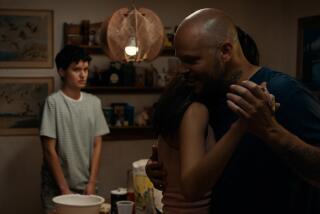A director returns with subtle grace
A film about the geometry of desire, “Springtime in a Small Town” opens with a vision of ruin. In a bombed-out Chinese village in 1946, in the wake of Japan’s retreat, a husband and wife pass the days in a somnolent haze. Cast away in a crumbling house, attended to by an elderly servant and with only the husband’s young sister for company, the pair live like refugees of the world and each other. When salvation glitters on the horizon in the form of a visitor, they rouse themselves as if from a dream, reaching out to a man preoccupied with his own deliverance.
Exquisitely directed by Tian Zhuangzhuang, whose earlier films include “Horse Thief” and “The Blue Kite,” “Springtime in a Small Town” reveals its mysteries with quiet deliberation.
Years earlier, the visitor, Zhichen (Xin Baiqing), had been in love with the woman, Yuwen (Hu Jingfan). The two separated and while he went off to pursue a doctorate in medicine, she entered into an arranged marriage with his old childhood friend, Liyan (Wu Jun). Reunited after more than a decade, the three take to one another with open arms. What Liyan doesn’t know -- to his emotional peril -- is that his wife and oldest friend were once lovers and that the ties that bound them were never fully severed.
Much of what happens in “Springtime for a Small Town” happens between the scripted lines. A masterwork of subterranean intention, the dialogue teems with pregnant pauses, artfully fragmented clauses and significant ellipses. Unfailingly polite, steeped in ceremony and beholden to personal loyalties, the three rarely say what they mean. They brush past one another, exchanging glances but little else. When Yuwen visits Zhichen’s bedroom, nothing in what she says indicates the depths of her feeling as much as the way she lets her words trail off (as if she hoped he’d pick them up). And, when she turns her head from her old lover, as she does repeatedly, we understand it’s because she wants him to force her gaze back toward him and away from the house that’s become a prison.
Based on a story that was turned into a classic of Chinese cinema in 1948, “Springtime in a Small Town” is a deceptively simple look at a complex web of emotion. Nearly devoid of close-ups, the cinematography keeps us absorbed in the film’s pictorial beauty and at a remove from the characters: Tian refuses to play favorites, and he doesn’t want us to either. “Everyone has their own good reasons,” a character says in Jean Renoir’s “The Rules of the Game.” As in Renoir’s masterpiece, the reasons in this chamber piece all come down to love -- who loves whom and why. Yet, as is also the case with Renoir, the outside world invariably has its say. However sympathetic, Liyan and Yuwen are rotting like spoiled fruit and in three years’ time the revolution will make their disquiet irrelevant.
“Springtime in a Small Town” is a lovely, understated work and rather unlike most of the movies we get a chance to see in this country, even within the better art houses. One of the satisfactions of foreign-language films isn’t just that they offer up putatively exotic locations and people but the possibility of experiencing new and novel ways of making meaning. This isn’t a radical film by any means, but in its gentle tempo, its avoidance of the obvious and stubborn insistence on the decency of its three touchingly human characters, “Springtime in a Small Town” weighs in as refreshingly, pleasurably different. For Tian, who was banned from directing by Chinese authorities for a decade, it marks a triumphant return; for those who have loved the filmmaker’s work in the past, few resurrections have seemed as welcome.
*
‘Springtime in a Small Town’
MPAA rating: PG, for some thematic elements
Times guidelines: Discreet adult themes
Hu Jingfan...Yuwen
Wu Jun...Liyan
Xin Baiqing...Zhichen
Ye Xiaokeng...Huang
Lu Sisi...Xiu
A Palm Pictures release. Director Tian Zhuangzhuang. Writer Ah Cheng. Based on the story by Li Tianji and the 1948 film adaptation by Fei Mu. Director of photography Mark Lee. Costume and image design Tim Yip. Production designer Cheng Guangming. Sound Lu Jiajin. Editor Xu Jianping. Music Zhao Li. Running time: 1 hour, 56 minutes.
Cecchi Gori Fine Arts Theater, 8566 Wilshire Blvd., Beverly Hills, (310) 281-8223
More to Read
Only good movies
Get the Indie Focus newsletter, Mark Olsen's weekly guide to the world of cinema.
You may occasionally receive promotional content from the Los Angeles Times.








